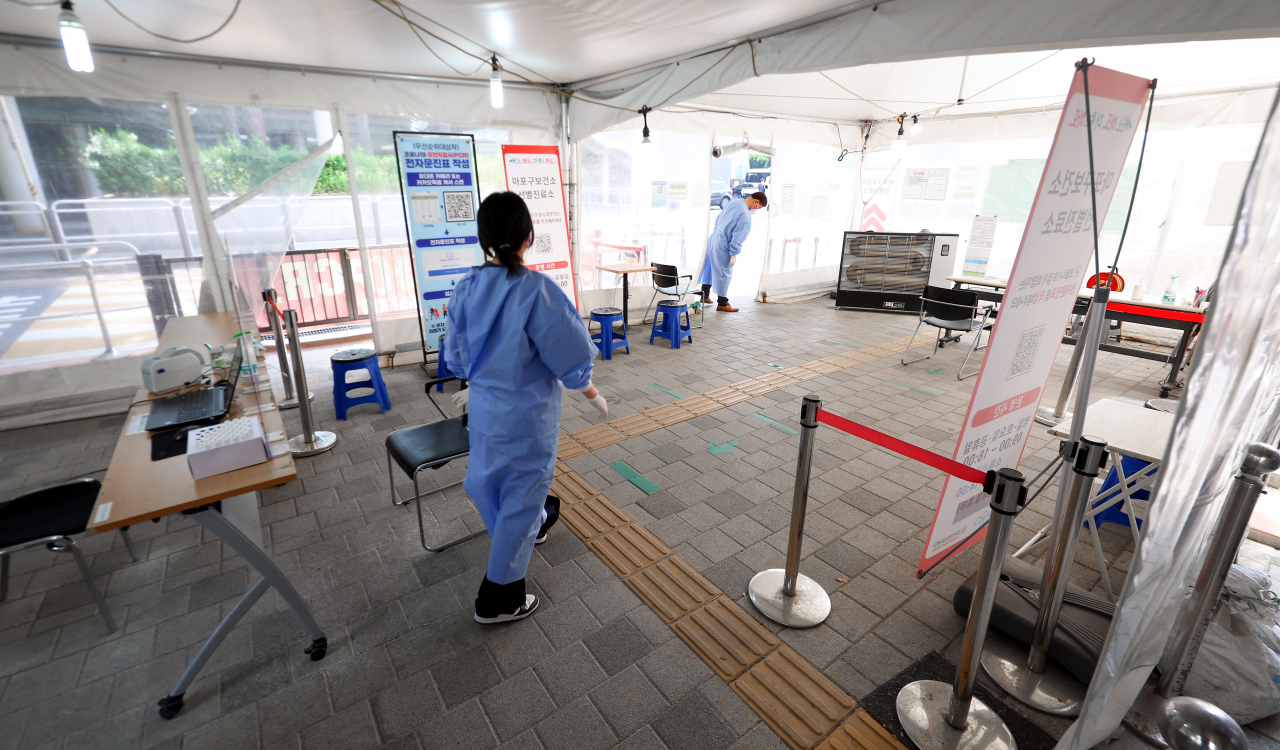At last, an end to COVID-19 emergency in South Korea
Isolation upon diagnosis no longer mandatory. Testing recommendation for travelers gone.
By Kim ArinPublished : May 11, 2023 - 15:44

COVID-19 will no longer be classified at the highest degree of emergency in South Korea from June, three years and four months after its designation as such.
President Yoon Suk Yeol convened a meeting of Cabinet members in charge of the COVID-19 response on Thursday and announced the country would be exiting the state of national emergency.
“Today the government COVID-19 response headquarters decided to downgrade COVID-19’s status as an emergency. It is a delight that South Koreans will be able to get back to normal life,” he said.
Saluting health care workers, Yoon said, "To get to this day our health care workers have been on the front lines of the pandemic, working under immense pressure. You have shown incredible dedication. On behalf of the South Korean people, I thank you."
He also thanked scientists for their work in developing vaccines and treatments and the people for complying with COVID-19 rules.
The president added that the government will not stop preparing for a possible next pandemic, cooperating more closely with other countries and investing in domestic vaccine development capabilities.
Speaking at a briefing held the same day, the Korea Disease Control and Prevention Agency chief Jee Young-mee said that although COVID-19 “isn’t over,” the forthcoming changes will mark “the beginning of treating it like other respiratory diseases.”
“COVID-19 is still a pandemic. The difference now is that we are managing it on an everyday response basis,” she said.
For many South Koreans who are already living near-normal lives, the emergency ending will not mean drastic changes.
Not all rules are going away, and policy efforts of reduced intensity will be maintained. Masking will continue to be required at all hospitals with beds. For at-risk groups, testing and treatment costs will remain covered.
Still some key changes include PCR testing not being recommended any more to people traveling to South Korea. Isolation for patients from the day of diagnosis will be recommended and not mandated, and the period cut to five days from the current seven.
Thursday’s announcement follows the World Health Organization declaring an end to COVID-19 as a public health emergency over the previous weekend.
The Ministry of Health and Welfare said that the WHO declaration, although an important consideration, was only one of many factors that were examined in shifting the country’s response. The decision to lift the emergency status was reached by consensus of government health officials and a committee of outside experts, the ministry explained.
South Korea’s decision to end emergency status, as with the WHO’s, is “reasonable” but future risks still lurk, according to Dr. Jerome Kim, director general of the International Vaccine Institute based in Seoul.
“Given the status of vaccination, boosting and hybrid immunity -- meaning vaccination plus infection -- in Korea, unless a radically different variant appears, the country is now in a position where the virus will infect but not cause disproportionate harm to the Korean people,” he told The Korea Herald.
The IVI chief added that although the country may be ready to transition out of emergency status now, progress could be threatened by a new, potentially disruptive variant.
“Will there be shifts in the severity and transmissibility in SARS-CoV-2? Possibly. Are we ready? No.”
He said that over the course of the pandemic, much of the world “moved on earlier than it was medically safe.”
“From an attitude perspective the world wants to move on. From a public health perspective, it hasn’t internalized the lessons and prepared for the future.”
He said that the country’s response as the emergency status expires should continue to stress testing and isolation for people working around those especially at risk of bad outcomes.
Infectious disease expert Dr. Kim Woo-joo of Korea University Medical Center warned the policy move comes at a time when the country is entering what may be the next large wave of cases.
“Since the beginning of the spring semester, we are seeing precursors of a possible eighth wave,” he told The Korea Herald.
According to Our World in Data, South Korea had the greatest caseload per million people, despite testing not being conducted as routinely. The R value, which measures how many secondary infections are generated per case on average, has been calculated at above 1 since the last week of March. An R value of 1 or higher means the spread is growing.
The last large wave of COVID-19 in the country was last summer, when omicron’s BA.5 subvariant was dominant, with the daily case count peaking at 151,708 on Aug. 10, 2022. The dominant variant here currently is XBB, which is deemed to be about 20 percent more transmissible than its omicron predecessor.
Kim, who heads the Korean Vaccine Society, said the government was “failing to do what is necessary to protect the medically vulnerable.”
Two-thirds of people in their 60s and older here have not yet been vaccinated with a vaccine updated to respond to two omicron subvariants. More than 30 percent of newly diagnosed patients were 60 and older, with the latest seven-day average death count pushed to two digits. Nearly half of intensive care beds were filled.
“The government ended the bivalent vaccine program early April. Additional booster shots are offered to people 65 and older, when the mark should be 60,” he said. “More than 40 million doses of vaccines are lying around, not getting to people’s arms.”
Since identifying its first case on Jan. 20, 2020, South Korea has counted a total of 31,351,686 cases as of Thursday. Officially, COVID-19 has claimed 34,583 lives of people here to date. Out of the eligible population aged 5 and up, 86 percent are fully vaccinated with a primary series. Among adults aged 18 and up, the full vaccination rate stands at 96 percent.



















![[Today’s K-pop] Treasure to publish magazine for debut anniversary](http://res.heraldm.com/phpwas/restmb_idxmake.php?idx=642&simg=/content/image/2024/07/26/20240726050551_0.jpg&u=)